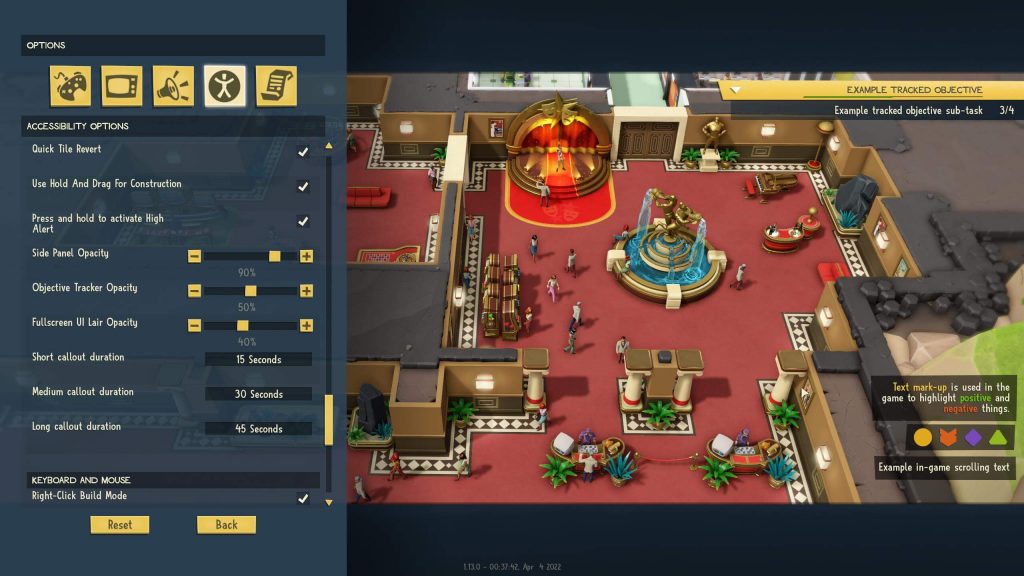Glossary
Here is a glossary of terminology used on this website.
A
Ability
Relevant to rewards.
The mental or physical capability of either a player or non-player character to perform a specific action. Examples include:
Fire Resistance.
Gravity Control.
Levitation.
Slowing Down Time.
Abuse
Verbal Abuse
Relevant to gameplay.
A form of abuse involving gestures, spoken words, or written language directed at a player or character with harmful intent.
Accessibility
Relevant to accessibility.
The capacity of a game to be played by players with varying abilities.
Accessibility Option
Relevant to accessibility.
A configurable setting that enables a game to be more inclusive, allowing a broader audience to engage with the game regardless of whether a player has an impairment.
A list of accessibility options available in Evil Genius 2: World Domination.
Credit: Rebellion Developments. Screenshot captured by the author.
Accuracy
Relevant to gameplay.
The ability to perform a task or action without making errors.
Achievement
Relevant to gameplay.
An in-game accomplishment that provides players with a sense of satisfaction or fulfillment.
Activity
Relevant to gameplay.
A sequence of actions undertaken by players or AI opponents to reach a specific objective.
An activity can represent a gameplay mechanic such as jumping, climbing, or driving.
Jumping in Rogue Legacy 2.
Credit: Cellar Door Games. Footage captured by the author.
Acoustic Attenuation
Relevant to output system.
The reduction in energy of a sound wave as it propagates through a medium.
Air Dash
Relevant to gameplay.
A gameplay mechanic in which a character rapidly moves through the air in a short, sudden dash.
An air dash in Celeste.
Credit: Extremely OK Games. Footage captured by the author.
Algorithm
Relevant to development.
A set of mathematical instructions or procedures used to facilitate the communication and management of a game’s state.
Ambience
Relevant to level design.
Background audio present in the game world, typically comprising secondary sounds that complement the player’s main focus.
Ambient Occlusion
Relevant to output system.
A graphical rendering technique used to calculate the level of ambient light exposure for each point in a scene, contributing to realistic shading effects.
Ammunition Type
Relevant to rewards.
A specific kind of cartridge used in projectile weapons, each designed for a particular function, including:
Armor-Piercing: Engineered to penetrate ballistic protection.
Blank: Designed to simulate the sound and effects of live ammunition.
Exploding: Detonates upon contact with a solid surface.
Incendiary: Contains combustible or explosive substances intended to ignite on impact.
Tracer: Includes a flare component for visually tracking a projectile’s trajectory.
Antialiasing
Relevant to output system.
A technique used in computer graphics to reduce the visual appearance of jagged edges in pixel-based images.
Architectural Visualization
Relevant to level design.
A three-dimensional rendering used by architects, designers, and homebuilders as a conceptual reference for constructing and decorating real-world architectural structures.
Area
Hazardous Area
Relevant to level design.
A location where explosive gas atmospheres may exist, including the presence of combustible dust, flammable gases or vapors, flammable liquids, or ignitable fibers.
Armor
Body Armor
Relevant to rewards.
Protective clothing worn by living organisms designed to absorb or deflect physical damage.
Vehicle Armor
Relevant to rewards.
A defensive system for vehicles that is engineered to withstand bullets, mines, missiles, shells, shrapnel, and rocket attacks.
Art Bible
Relevant to development.
A document outlining the visual artistic direction and stylistic guidelines of a game.
Art Style
Relevant to development.
A collection of distinctive artistic techniques and processes commonly used to create artworks.
Artificial Intelligence (AI)
Technology designed to emulate human cognitive functions in machines, enabling them to perform tasks and make decisions in a manner that simulates human intelligence.
Artwork
Relevant to development.
A visual creation such as a drawing, painting, or photograph, used as a representation or asset within a game.
Assault Rifle
Relevant to rewards.
A firearm characterized by the following features:
A detachable magazine.
A standard rifle cartridge with a diameter typically between 5 mm and 8 mm.
Multiple firing modes, including:
Semi-automatic: Fires one round per trigger pull.
Burst: Fires a predetermined number of rounds, typically 2 or 3, per sustained trigger pull.
Automatic: Continuously fires rounds as long as the trigger is depressed or until the ammunition is depleted.
Designed to be shoulder-fired.
Asset
Relevant to level design.
See Game Asset.
Assist Mode
Relevant to accessibility.
A feature that allows players to configure settings which specifically affect the player character or vehicle, with the intention of reducing difficulty. Examples include:
Aiming Assist.
Braking Assist.
Shifting Assist.
Steering Assist.
Attack
Relevant to gameplay.
See Role.
Ranged Attack
Relevant to gameplay.
An offensive action performed using a ranged weapon.
Atmosphere
Relevant to atmosphere.
The emotional tone or mood conveyed by a particular place, environment, or situation.
Audience
Relevant to business.
See Target Audience.
Audio
Relevant to output system.
Refers to sound elements within a game, including but not limited to:
Authorship
Relevant to gameplay.
The role of the player as the primary agent who determines and controls the unfolding of events within a game.
Autopilot Controller
Relevant to control system.
An input device used to manage and adjust autopilot settings within flight simulation software.
Autosaving
Relevant to accessibility.

